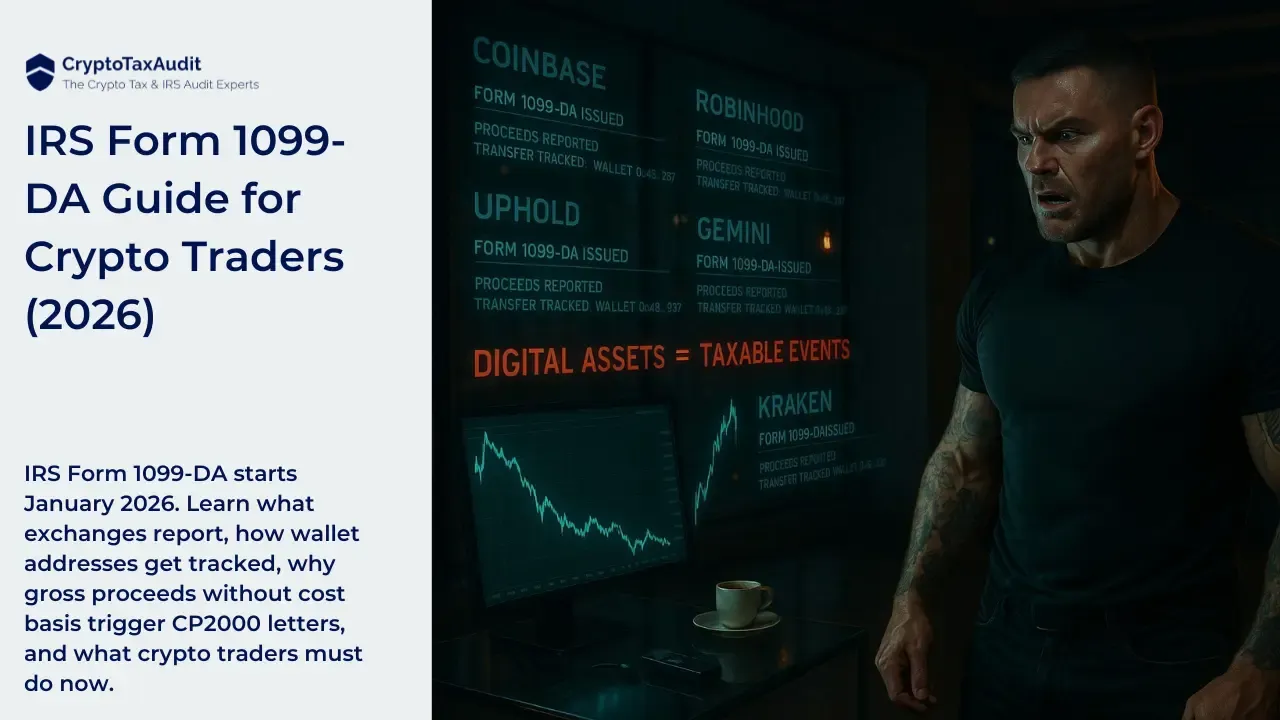
Black Friday Flash Crash: Did Your Liquidation Just Create Taxable Income?
By Clinton Donnelly, CEO, Founder | CryptoTaxAudit
People lost $7 million. One person? $13 million.
The Black Friday flash crash on October 10th wiped out portfolios in minutes. Stop losses triggered. Collateral vanished. Exchanges froze.
And now? The IRS wants its cut.
Here's what happens when your forced liquidation becomes a tax event.
Key Takeaways
- If your stop loss sold above cost basis, you made a profit (and owe taxes)
- Collateral seizures create two tax events: the asset sale AND cancellation of debt income
- The proposed wash sale rule for crypto would punish investors who buy back within 30 days
- Binance's $278 million compensation is likely a non-taxable gift
- Failed stop losses might qualify as Form 4684 casualty losses (no $3,000 cap)
Did You Actually Have a Loss?
First question: did you lose money or just not make what you hoped?
If your stop loss was above your cost basis, you had a gain. Report it.
The unrealized gains that disappeared? Those don't matter. You don't pay taxes on them. You don't deduct them either.
A forced liquidation depends on one thing: whether you sold above or below your cost basis.
Above = gain. Below = loss.
That's it.
What Happens When Your Collateral Gets Seized?
You put up crypto as collateral for a loan.
The flash crash tanks the value.
Exchange pulls your collateral. Loan terminated.
Now what?
Two tax events just happened:
- The collateral you put forward got sold at whatever price. You report a gain or loss on that sale. Most people will have a gain.
- The money you borrowed? That's now yours. You don't owe it back. Under IRC §61, cancellation of debt is income.
Both hit your tax return.
The Wash Sale Rule Is a Stupid Rule
Right now, crypto isn't subject to the wash sale rule under IRC §1091.
But there's a bill in Congress. Senator Cynthia Lummis put forward the Digital Asset Tax Legislation. It would impose wash sale rules on crypto.
Here's how wash sales work for stocks:
You sell for a loss. You buy back within 30 days (before or after the sale). You can't claim the loss.
This would kill tax loss harvesting for crypto investors who buy back quickly.
Here's my problem with it:
There is no valid reason why a taxpayer should be burned when they experience a loss. Or choose to realize one.
Allow investors to invest. Why complicate it?
The rule is easy to circumvent anyway. Buy on a different exchange. Brokerages don't track cross-platform activity. The IRS doesn't check for it.
Once you get burned by it, you figure out how to avoid it.
It's a tax on being stupid. There's no benefit for investors or the government.
If someone genuinely experienced a loss but wants to stay invested in that position? Let them.
Every tax should have a compelling societal reason. This one doesn't.
The only justification you'll hear: "We do it for stocks, so we should do it for digital assets."
My answer? Stop doing it for stocks too. Get rid of it.
Tell your senator: don't support that provision. That's my opinion.
Is Binance Compensation Taxable?
Binance offered to compensate users who lost assets due to collateral de-pegging. They're giving away $278 million worth of assets.
What's the tax treatment?
You already experienced a loss (or small gain) in the flash crash. Now you're receiving tokens at no charge to compensate for that loss.
In my opinion, that's a gift.
It's not income under IRC §102. Even though it's coming from a company, it's not taxable to you.
You don't have to report it as income.
But here's what you do need to track: the price at which those tokens were given to you establishes your cost basis. Record that. When you sell later, that's your basis.
If you need help tracking crypto basis across multiple events like this, CryptoTaxAudit can calculate your entire history and handle complex situations like exchange compensation.
Can You Claim This as a Casualty Loss?
Some people placed stop loss orders. The orders failed.
The crash happened too fast. Liquidity dried up. The exchange didn't execute. Assets went to zero.
Can you claim a theft or casualty loss?
Losses are a natural part of investing. That's investor risk. So no, not a theft loss.
But if there was a failure, if the exchange didn't act when it should have, you might have grounds to claim it as a casualty loss.
Here's how that works:
You report it on Form 4684, Part B. It rolls up to Schedule A (itemized deductions) on your 1040.
If it's significant enough, this adds to your deductions.
The nice thing? You're not limited to the $3,000 capital loss cap under IRC §1211.
Casualty losses go on itemized deductions. You can deduct the full amount.
I've seen people take their entire taxable income down to zero with this deduction.
Fair warning: The IRS scrutinizes casualty loss claims. You might get a letter asking if this is frivolous. Make sure you have documentation.
Each person's situation is different. Talk to a professional.
Frequently Asked Questions
Q: If my stop loss triggered during the flash crash, do I owe taxes even though I lost most of my gains?
A: Yes. If you sold above your original cost basis, you realized a gain. The unrealized gains you lost don't offset that. CryptoTaxAudit can help you calculate exactly what you owe based on your actual cost basis.
Q: Can I deduct my flash crash losses if I bought back in right away?
A: Right now, yes. Crypto isn't subject to wash sale rules. But if the proposed Digital Asset Tax Legislation passes, buying back within 30 days would disallow your loss. CryptoTaxAudit tracks these transactions and can help you plan around wash sale implications.
Q: Is the money from my liquidated collateral loan taxable?
A: Yes, twice. First, the sale of your collateral creates a gain or loss. Second, the forgiven loan amount is cancellation of debt income under IRC §61. Both must be reported. CryptoTaxAudit specializes in complex DeFi tax situations like this.
Q: How do I report Binance compensation on my tax return?
A: You likely don't. In my opinion, exchange compensation for losses is a gift, not income. But track the fair market value when you receive it as your cost basis. When you later sell, that basis determines your gain or loss. CryptoTaxAudit can help you document this properly.
Q: Can I use Form 4684 to deduct my entire flash crash loss if my stop loss failed?
A: Possibly. If there was an exchange failure or your orders weren't executed properly, you may have grounds for a casualty loss. Report it on Form 4684 Part B, which flows to Schedule A. Unlike capital losses, there's no $3,000 limit. But expect IRS scrutiny—document everything. CryptoTaxAudit can review your case and prepare the documentation.
Q: What's the difference between a capital loss and a casualty loss for crypto?
A: Capital losses (from normal trading) are limited to $3,000 per year under IRC §1211. Casualty losses (from theft, exchange failure, or disaster) go on Schedule A with no annual limit. But you need to prove the loss was from a casualty event, not normal market risk. CryptoTaxAudit can help determine which applies to your situation.
Q: If I lost money in the flash crash, can I just not report it?
A: No. Every crypto transaction is reportable. Exchanges report to the IRS. Not reporting creates audit risk and penalties. Even losses must be reported—they can offset other gains. CryptoTaxAudit handles full-service crypto tax preparation and helps you report correctly the first time.
What to Do Next
The Black Friday flash crash created a tax mess for thousands of crypto investors.
Forced liquidations. Collateral seizures. Failed stop losses. Exchange compensation.
Each one has tax consequences.
If you have a complex crypto tax situation from the flash crash, you need someone who's handled this before. CryptoTaxAudit is the number one firm in the US doing full-service crypto tax preparation, gain calculation, and IRS audit defense.
We've seen every scenario. We know what the IRS is looking for. And we'll make sure you report correctly—so you don't get a letter later.




